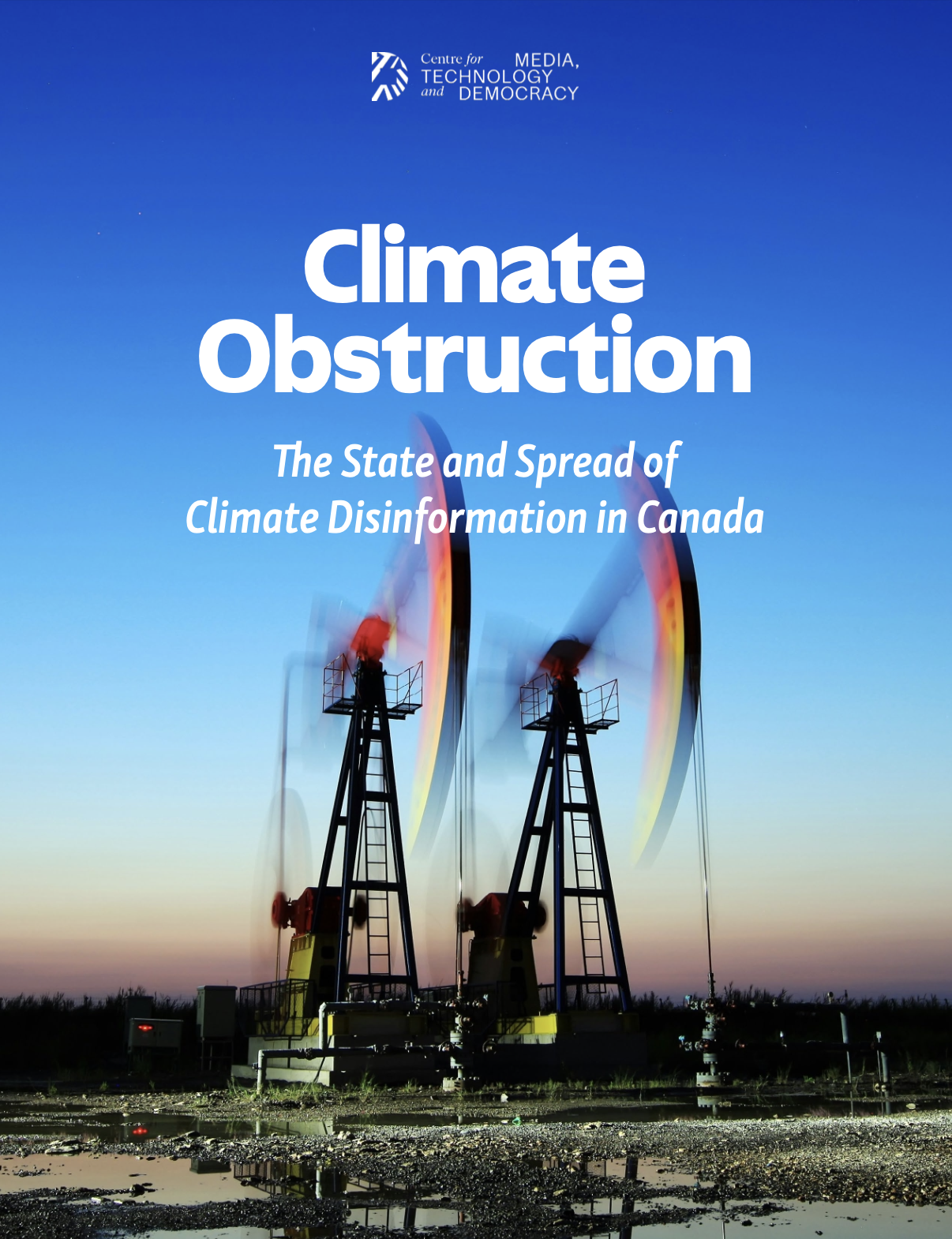Climate Obstruction:
On the State and Spread of Climate Disinformation in Canada
January 2025While climate denial historically defined opposition to climate action, the discourse is increasingly shifting into new territory online: climate delayism. These delay tactics leverage discourses that accept the existence of climate change, but nevertheless downplay its urgency and sow doubt in potential solutions.
What’s more, the rapid spread of mis- and disinformation online—and platforms’ inability and recent overt unwillingness to regulate it—has supercharged these climate delay narratives. But climate disinformation is not just a social media problem: it operates through a complex and historically situated network of powerful actors with vested interests, and is woven into the fabric of Canadian nationhood and identity itself. We need to understand how climate delay and disinformation narratives circulate and find resonance in our broader information ecosystem. To that end, this report analyzes Canadians’ response to prominent climate delay narratives and presents key findings and policy implications for the burgeoning problem of climate disinformation in Canada.
Principal Investigator: Sonja Solomun
Research Lead: Helen A. Hayes
Survey Lead: Isadora Borges Monroy
Researchers: Julia Bugiel, Esli Chan, Nikhil Gowd, Nina Hernández Jayme, Sequoia Kim, Hannah Tollefson
Survey Analyst: Christopher Ross
Suggested citation: Solomun, S., Monroy, I. B., Bugiel, J., Chan, E., Gowd, N., Hayes, H. A., Jayme, N. H., Kim, S., Ross, C., & Tollefson, H. (2025). Climate Obstruction: On the State and Spread of Climate Disinformation in Canada. The Centre for Media, Technology and Democracy. mediatechdemocracy.com/ climate-obstruction-report
Key survey findings:
-
Most Canadians believe in climate change, yet less than half believe they are currently impacted by climate change.
While most respondents (77%) agreed that climate change is real, less than half believed they are currently being impacted by climate change.
-
All tested climate disinformation and delay narratives had high resonance among Canadians:
Hypocrisy and elitism emerged as the most persuasive delay narrative (67%), suggesting discontent in governmental action and distrust of politicians’ sincerity.
53% of respondents resonated with “Absolutionism” narratives, which offload responsibility elsewhere, posing a challenge for unified, global action on climate change.
More than half of respondents agreed with the “ethical oil” narrative, indicating that Canadians’ perception of their national identity and moral standards are intertwined with fossil fuel extractivism.
40% of respondents believed in the Indigenous empowerment narrative, suggesting that ideas about Indigenous empowerment may be leveraged and co-opted to foster wider support for oil and gas projects.
41% of Canadians agreed with the unreliable renewables and ineffective electric vehicles narrative, but almost all were still likely to support investment in renewables as a form of government action, as opposed to alternatives such as carbon tax.
-
Partisanship overwhelmingly predicts individuals’ feelings toward carbon pricing: individuals who were Conservative-partisan were over three times more likely to be against carbon pricing than Liberal or NDP partisans.
-
Respondents were more likely to prefer climate action at the government or corporate level as compared to the individual level, and preferred climate action that they perceived would have the least impact on their economic wellbeing.
Note on methods: Data for this report includes nationally representative survey responses from 2,112 Canadian adults conducted from January 4, 2024, to January 12, 2024, using Abacus. The margin of error for a comparable probability-based random sample of the same size is +/-2.13%, 19 times out of 20. Values shown are weighted means, weighed by gender, region, and age according to Statistics Canada.

